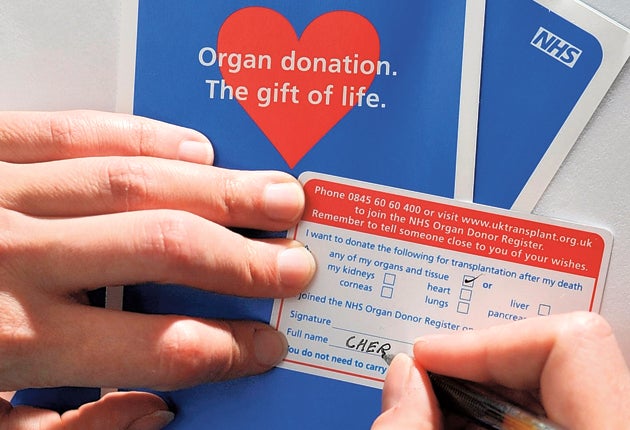Should registered organ donors be 'fast-tracked' on transplant waiting lists?
NHS to consider far-reaching proposals that favour organ donors across the health system

The NHS is considering a broad range of reforms that could see registered organ donors receive higher priority on transplant waiting lists and prevent families from overriding their consent after their death.
The new approach would see registered donors jump the queue ahead of patients who were not signed-up and ensure a person’s wish to donate to those in need is honoured after they die. It is part of a strategy to increase the number of organs being donated in the UK.
Proposals by NHS Blood and Transplant (NHSBT), which have the backing of four UK health ministers, also encourage smokers, drinkers and elderly people to register as donors. Their aim is to build on the 50 per cent increase in deceased donation rates since 2008.
Officials at NHSBT said families often override their relative’s wishes by refusing permission for a transplant, a practice that contributed to the deaths of more than 1,300 patients awaiting transplants last year. The consent rate from relatives is currently 57 per cent, a proportion NHSBT want to see rise to 80 per cent.
Their report says there should be a "revolution in public attitudes and behaviour" so that individuals and families take pride in supporting donation. It adds that awareness of organ donation remains low outside the NHS but can be increased through education and publicity campaigns.
Dr Paul Murphy from the organisation said: "When a family says no to donation it means someone's hopes of a life-saving transplant are dashed. They need to understand the consequences of refusal."
On the issue of fast-tracked transplants for those already on the donor list, the Associate Medical Director of NHSBT, Professor James Neuberger, added: “They do this in Israel and it has encouraged donation.
“It was first introduced in Singapore. While they don’t exclude those who don’t donate, it gives priority to those who are on the donor register. Whether it is appropriate for the UK is up for debate and discussion.”
Sally Johnson, the body’s Director of Organ Donation and Transplantation, echoed the need for dialogue: "We need to have a serious debate in our society about our attitudes - is it fair to take if you won't give?
“Is it acceptable that three people die a day in need of an organ? Is it right to allow our organs to be buried or cremated with us when they could save or improve the lives of up to nine people?"
The reforms have been floated a week after the Welsh assembly voted to introduce an opt-out donors register from 2015. As a result, Wales will be the only UK country where an individual’s presumed consented will be warrant enough for their organs to be donated.
Subscribe to Independent Premium to bookmark this article
Want to bookmark your favourite articles and stories to read or reference later? Start your Independent Premium subscription today.

Join our commenting forum
Join thought-provoking conversations, follow other Independent readers and see their replies